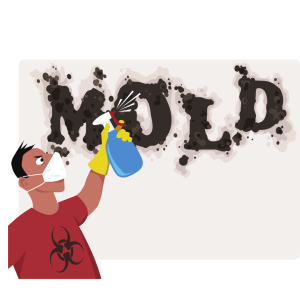What is mold?
Molds are fungi that can be found everywhere. They reproduce by means of spores that are invisible to the naked eye and float through outdoor and indoor air. These fungi can grow on almost any substance where moisture is present. Molds can grow on ceilings, walls, under sinks, drywall, ductwork, furniture, and wood, among other materials. When there is a lot of moisture present, high humidity, and temperatures are above 65°F, mold spores become active and start to grow rapidly. There are many types of mold, and none of them will grow without water or moisture. Outdoors, molds can break down dead organic matter, such as fallen leaves and dead trees. There is no practical way to eliminate all mold and mold spores in the indoor environment. The key to controlling indoor mold growth is controlling the moisture source.
What can I do if I suspect I have mold in my home?
- If you live in an apartment and you feel that your landlord/property manager has not promptly addressed your concerns, please contact the Virginia Office of the Attorney General’s Consumer Protection Section. The Office of Consumer Protection provides information to individuals on matters related to landlord-tenant issues, and can be reached at either 804-786-2042 or 1-800-552-9963. Additionally, the Virginia Residential Landlord and Tenant Act (Sections 55-248.2 through 55-248.40 of the Code of Virginia) establishes the rights and obligations of residential landlords and tenants in the Commonwealth, but only the courts can enforce those rights and obligations. To review the Act, visit: https://www.vdh.virginia.gov/content/uploads/sites/20/2022/08/2021-landlord-tenanthandbook.pdf.
- If you own a residential home, it is recommended to contact a mold assessment, remediation, or removal company that holds a certification from the American Industrial Hygiene Association or follows guidelines from the Environmental Protection Agency (EPA). The Virginia Department of Health (VDH) does not assess the credentials of, or make recommendations regarding, specific mold specialists.
- Mold Clean-Up: For large areas covered with mold, it is best to seek help from a professional. The Commonwealth of Virginia does not require contractors to be licensed to inspect or remediate mold. Contractors should be able to provide a list of referrals and may also hold certifications from private industrial hygiene associations, such as the American Industrial Hygiene Association.
- Small areas of mold (less than 10 square feet) can be cleaned up from hard surfaces with detergent and water, or a mild bleach solution.
- VDH does not have the capability to provide environmental testing or remediation for mold problems, or provide legal advice. If you are concerned about mold, more information and resources may be found here or by consulting the EPA’s Guide to Mold and Moisture in a Home.


